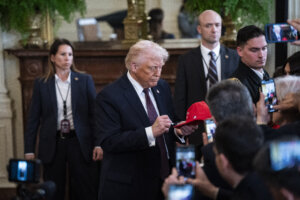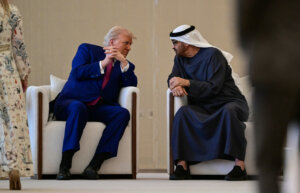‘I actually did vote for this’: Orthodox Trump voters worry about Qatar, Israel, tariffs – but stand by their candidate
The president’s coziness with Qatar dismayed some of his most loyal Jewish supporters. But not as much as defunding Columbia thrilled them.

President Donald Trump speaks with Emir of Qatar Tamim bin Hamad al Thani in Doha on May 15. Photo by Win McNamee/Getty Images
When Donald Trump rode a wave of cross-cultural support back into the White House last November, many Orthodox Jews — four out of five, according to one poll — celebrated.
He was their candidate: a pro-Israel tough who held wokeness in contempt, understood the economy and was willing to break glass to fix the antisemitism festering in American institutions.
Orthodox voters have not been immune to the frustrations that dragged Trump’s 100-day approval rating to the lowest of any president in 80 years. Among them are Elon Musk skeptics, business owners who have been slammed by the tariffs and devout Zionists wary of Israel being sidelined.
Mayer Fertig, a Trump voter who owns an HVAC business in Teaneck, New Jersey said Trump’s acceptance of a plane from Qatar was “ridiculous” and “absurd.” But he was taking the few disagreements he had with the president in stride.
“I keep seeing memes online,” Fertig said, “where people write something they consider to be outrageous that he’s done, and they say, ‘Did you vote for this?’ And the answer almost always is yes. I actually did vote for this.”
A May GBAO poll highlighted the depth of political disagreement between Orthodox and non-Orthodox Jewish voters. Actions seen by most Orthodox Jews as fighting antisemitism were seen as worsening it by everyone else; overall, Orthodox voters gave Trump a 75% approval rating, compared to 35% from Conservative Jews, 18% from Reform and 19% from unaffiliated Jews. GBAO typically polls for Democratic and liberal-leaning groups.
Interviews with Orthodox community leaders from across the United States underscored the resilience of their support for Trump, even amid glimpses of discontent; while enthusiasm among some has waned, confidence in their choice has not.

Tariff squeeze
In the Haredi Orthodox stronghold of Lakewood, New Jersey, where community leaders estimated Trump received north of 90% of the vote, cracks are beginning to show around the tariffs. Many in the Lakewood community work in e-commerce and manufacturing, and those dependent on imports from China and Canada have been particularly vulnerable.
A recent article in The Voice of Lakewood, a local outlet, quoted an Orthodox clothing seller who worried about losing a season’s worth of income. Another community member, a grandmother, called the tariff hikes “the dumbest economic policy any president has done in my lifetime.” A Haredi toy manufacturer — staring down a 145% tariff on imports from China — had simply turned to God.
“So many of us thought Trump was our savior,” the manufacturer told the publication. “And this is a message for all of us Yidden to remember that only Hashem is in control.”
Still, others from the same community remained bullish. Eli Steinberg, a Lakewood-based political commentator, said there was general optimism in the community that the tariffs would in the long run help reduce China’s economic might. Moreover, he said, their concerns were outweighed by other Trump administration measures that serve the Haredi community, like the inclusion of a $20 billion federal school voucher program — long advocated by Haredi groups — in the proposed budget reconciliation bill.
“As much as you like the guy — and I really have come to respect him a great deal — he's not going to do everything that I want him to do.”Mayer FertigTrump voter
Orthodox Trump voters outside the Haredi world were also wrestling with the tariffs. Jason Ciment, who runs a marketing firm in Los Angeles, said he had lost multiple clients due to the tariffs, making a “material” impact on his business.
But Ciment, who is on the slate of Israel365 Action, a World Zionist Congress party, said to look at the big picture. On antisemitism, Trump had been “awesome,” although he did not like the apparent violations of due process on deportation proceedings. On the Middle East, he said he would wait and see.
“I’m happy with my choice, but I’m not happy with all the outcomes,” Ciment said. “I’m not pretending that things are okay, and I’m also not waffling.”
Middle East worry
During Trump’s recent visit to the Middle East, frustration bubbled on social media from some of his most vocal backers in the Orthodox world.
Accepting a $400 million plane as a gift from Qatar raised eyebrows, as did his effusiveness towards Syrian President Ahmad al-Sharaa, whom Israel’s leaders do not trust to keep their shared border peaceful.
Trump left Israel off the state tour — and out of the ceasefire he negotiated with the Yemen-based Houthi militants — and teased a possible nuclear agreement with Iran.
Trump’s coziness with Qatar has been a particularly sensitive topic for pro-Israel Jews. The country funneled billions of dollars to Hamas and has provided haven for its leaders. It was one thing for Trump to negotiate directly with them, leaving Israel out of the process — and another for the president to praise Qatari leaders and accept their lavish gifts.

After Trump asked freed American-Israeli hostage Edan Alexander to meet him in Qatar with the country’s leaders, Fertig, the HVAC business owner, reshared a post calling the pressure on Alexander “absolutely contemptible.” (Alexander declined.)
Fertig never expected to agree with Trump on everything — anyone who did, he said, was utterly naive — and he was willing to extend the benefit of the doubt to the president on Middle East policy, trusting him to be a bold negotiator, not a conventional one. And Trump had not pulled his support for the Israel-Hamas war, even as Israel Prime Minister Benjamin Netanyahu pursues a re-occupation of Gaza.
“As much as you like the guy — and I really have come to respect him a great deal — he’s not going to do everything that I want him to do,” Fertig said. “Do I think that he’s throwing Israel under the bus? No, absolutely not. I think he’s got his usual game plan, and it may well work.”
Shlomo Schorr, director of Agudath Israel of New Jersey, a Haredi umbrella organization, said that while Orthodox voters in the state would generally give the president “pretty high grades,” Trump’s approach to the Middle East was greeted with some apprehension. He pointed to the release of Alexander, secured by the United States without Israel’s involvement, as an example.
“There were some concerns from some people that it seems like Israel was left out of it,” Schorr said. “But I think the average person is not following that closely, and just sees that he was returned home and appreciates that for what it’s worth.”
Victory laps
No matter what Trump policies they objected to, none of the Orthodox Trump voters who spoke to the Forward said they were reconsidering their vote. Steinberg, the Haredi commentator, noted that “all politics are binary,” and the other candidate on the November ballot, Vice President Kamala Harris, was a nonstarter.
Meanwhile, picking up on a trend from his first term, Trump has rewarded his Orthodox base by putting members of the community in positions of power. He nominated a Lubavitcher, Yehuda Kaploun, to serve as antisemitism czar, and put four Orthodox rabbis on his newly formed Religious Liberty Commission.
To his Orthodox supporters, Trump’s central political achievement so far — and the reason they were willing to stomach whatever meshugas arose — was his fight against antisemitism and war on “wokeness,” the term conservatives apply to perceived leftist overreach. In light of those improvements, Steinberg said, something like the tariffs might just be seen as “a cost of doing business.”
Trump’s measures against antisemitism have been widely condemned by non-Orthodox Jews. Around 70% of Reform Jews, 53% of Conservative Jews and 63% of unaffiliated Jews said deporting pro-Palestinian protesters would increase antisemitism in the GBAO poll. Only one in four Orthodox Jews shared that view.
To Fertig, the Teaneck business owner, the pro-Palestinian protesters who had been pulled off the streets by immigration enforcement agents got what they deserved. He did not think their arrests violated due process. “Anybody who stands up and basically walks around in Hamas garb and threatens Jews and calls for a global intifada is a terrorist,” he said. And his only gripe with the president’s squeeze on college campuses was that he hadn’t gone further.
“Our universities have been completely subverted by the left, and they have used it to completely poison the minds of an entire generation of young people,” he said. “Frankly, there is almost nothing Donald Trump might do to a university that I would not be very happy about.”
Correction: A previous version of this article misstated the location of Mayer Fertig’s business. It is in Teaneck, not Newark.

















